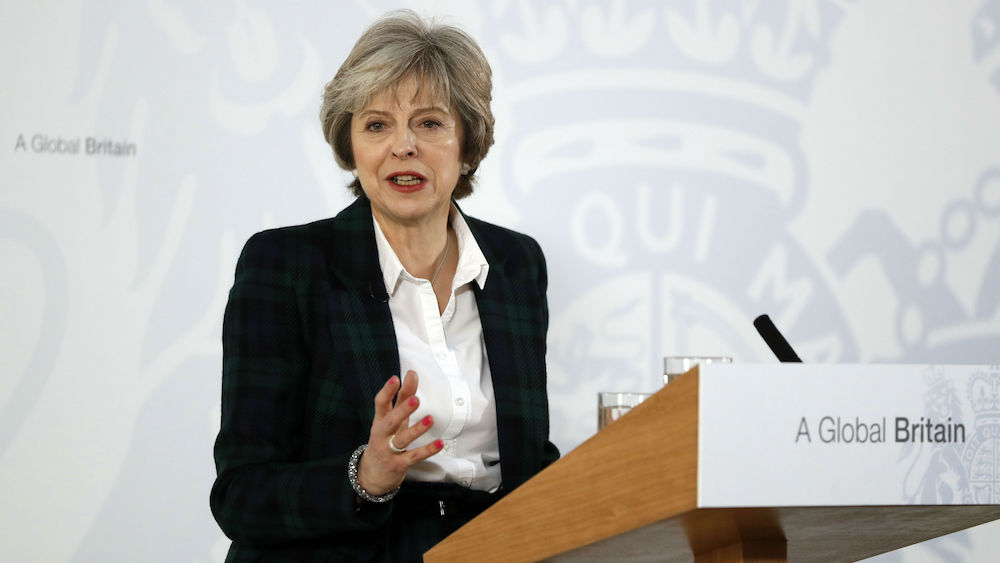During the EU referendum campaign, British voters were told the United Kingdom could be like wealthy non-EU members Norway and Switzerland. Now the prime minister has explained that it cannot.
After six months of prevarication and uncertainty, British Prime Minister Theresa May acknowledged on Tuesday that the idea of ending free movement while remaining part of the European Union’s single market, the strategy pursued by her government over the past six months, will never be accepted by the other 27 EU countries.
The United Kingdom has been left with only two choices: a “hard Brexit” – completely leaving the European Union, its common market, and its customs union – or no Brexit.
But May did not present this as reality dictated by her EU partners. Instead, she presented it as her government implementing the will of the people, as expressed in the June 23 referendum.
“A little over six months ago the British people voted for change. They voted to shape a brighter future for our country,” she said. “They voted to leave the EU and embrace the world. And they did so with their eyes open: accepting that the road ahead will be uncertain at times, but believing that it leads toward a brighter future for their children – and their grandchildren, too.”
“Only A Madman Would Leave”
That the British people had their eyes open on June 23 is a dubious claim. During the referendum campaign, leave campaigners repeatedly asserted that the UK would continue to be able to trade unhindered with the EU after a Brexit. They held up Norway as an enticing example, pointing out that it is not in the EU but is still part of the single market. They apparently were unaware, or chose to ignore, that in return for that single market access, Norway has to pay into the EU budget and follow almost all EU law, including allowing EU citizens to live and work in Norway. The same is true of Switzerland and Iceland.
“Absolutely nobody is talking about threatening our place in the single market,” insisted prominent Leave campaigner and Conservative MEP Daniel Hannan during the campaign. “Only a madman would actually leave the market,” asserted Conservative MP Owen Paterson, another prominent Vote Leave backer. “The Norway option looks the best for the UK,” said Arron Banks, the co-founder of Leave.eu and main financier of the anti-EU campaign.
Even Nigel Farage, the bombastic leader of the UK Independence Party, repeatedly held up Norway and Switzerland’s status as evidence that Western European countries can thrive while not being in the EU (even though these countries are, for all intents and purposes, pseudo-EU members). “Wouldn’t it be terrible if we were really like Norway and Switzerland? Really? They’re rich. They’re happy. They’re self-governing.”
Indeed, May’s Conservative Party promised to “safeguard Britain’s interests in the single market” in its 2015 party manifesto. It stated quite plainly, “We say: yes to the single market.”
But as of today, the Norway model is off the table. “We do not seek to adopt a model already enjoyed by other countries,” May explained. “We do not seek to hold on to bits of membership as we leave.” It is a reversal on what was pitched to UK voters during the campaign.
The problem, as May’s government came to learn over the past six months, was that the anti-immigrant focus of the referendum campaign meant that the Norway model alluded to by leave advocates was impossible. May could only accept a flexible Norway option in which the UK was given a special exemption from free movement requirements. And EU leaders have made clear that such flexibility was a non-starter. The UK would not be given privileges not enjoyed by others.
Despite the picture painted by May, today’s policy speech is not what British voters were told to expect during the referendum campaign. The common refrain was that “the EU needs Britain more than Britain needs the EU,” and the assumption was that the rest of Europe would be only too willing to make exceptions for the UK – giving market access without free movement obligations – in order to have access to the booming British economy. Those assumptions have been proven to be very misguided.
A Withdrawal With Open Eyes?
May insisted today that British voters backed a complete British withdrawal from the EU “with their eyes open.” This seems to imply that there was a clear plan presented to them for Brexit. But if there was such a plan, one might assume it would have been negotiated, and implemented, shortly after the vote occurred.
Instead, May’s government has spent the past six months attempting to convince the other 27 EU governments to accept an arrangement in which the UK could retain single market “access” while ending free movement – or as EU Council President Donald Tusk put it, “having their cake and eating it too,” echoing a famous utterance by Brexit campaigner Boris Johnson, now Britain’s foreign secretary.
If the British public’s choice was really so clear and well-informed, May would have made this speech six months ago. That she is making it in January 2017 just shows that nobody had any idea what Brexit meant last June. Now things have become marginally clearer. But it would be folly to say that this clarity was present on June 23.







